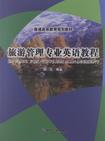旅游管理专业英语教程
2012-10
知识产权出版社
郭红
218
3000000
《旅游管理专业英语教程》是为高等院校旅游类专业学生编写的专业英语教材。全书共分13课,课文内容新颖,题材广泛,涉及旅游业的方方面面,及时地向学生传递旅游业相关知识信息。本教材在加强专业知识训练内容的同时,在前瞻性、系统性、实用性等方面有所突破。本书特点如下: 一是突出旅游专业知识的系统性。本教材主要是写给旅游管理专业的学生看的,要使学生不仅仅满足于知道专业术语的英文表达,而且要能够通过本教材的学习,加强对旅游整个行业的理解。 二是实用性。旅游行业的实践性非常强,教材精选我国旅游业界的经典案例作为练习,使学生能够把理论与实践相融合,因此本教材强调应用性,注重加强对学生运用专业英语能力的训练。 三是前沿性。引进国外旅游学研究的最新成果,以及最新的经典案例,做到教材编写与时俱进。 本教材由于选材广泛,书中没有一一注明出处,只列出了主要的参考文献,希望得到原作者的支持与谅解,在此作者表示诚挚的谢意。 由于编者水平和经验有限,书中难免有疏漏和不足,希望读者批评指正。 本书在出版前,一直作为北京联合大学旅游学院旅游管理专业的专用教材,本书得到北京联合大学旅游管理市级重点建设学科专项经费的支持;在写作过程中,尤其得到旅游管理系宁泽群教授的鼓励和帮助,以及知识产权出版社蔡虹编辑的帮助,在此表示衷心的感谢。 本教材中的练习的参考答案,不便在教材中提供,以免影响教师授课效果。
本教材是为高等院校旅游类专业学生编写的专业英语教材,旨在帮助学生扩展旅游专业知识的同时,熟练掌握一定的旅游专业词汇和行业用语,培养学生专业英语的表达能力,能够直接阅读国外的专业性、学术性书刊,并进一步巩固英语语言基础,提高旅游管理专业学生的专业英语实际应用能力。
本教材内容新颖,题材广泛,涉及旅游业的方方面面,及时地向学生传递旅游业相关知识信息。本教材在加强专业知识训练内容的同时,在前瞻性、系统性、实用性等方面有所突破。
郭红,女,汉族,1967年生。现北京联合大学旅游学院休闲与旅游管理系讲师。毕业于法国昂热大学旅游饭店管理学院,获得旅游、饭店与接待业管理硕士学位。长期从事旅游管理专业英语教学活动。
Contents
Unit 1 Introduction to Tourism Industry
Unit 2 The History of Tourism
Unit 3 Tourist Transport (1)
Unit 4 Tourist Transport (2)
Unit 5 Hospitality and Related Services
Unit 6 The Lodging Industry
Unit 7 The Food Services Industry
Unit 8 Visitor Attractions
Unit 9 Tourist Motivation
Unit 10 The Economic Impacts of Tourism
Unit 11 The Social Impacts of Tourism
Unit 12 Tourism Marketing
Unit 13 Sustainable Tourism and the Future of Tourism
Reference Books
版权页: Intangibility The products of most industries are tangible ; they can be seen, tasted, felt,heard or smelt before they are consumed. Hospitality products have both tangibleand intangible components. For example, if a customer buys an inclusive tourfrom a travel agent, he not only buys a bed in a hotel room and 3 meals in a restaurant, but also buys " a dream", he gets the intangible befits -- pleasure, relaxation, convenience, excitement- that the experiences can yield. The serviceproduct is intangible when it cannot be easily evaluated or demonstrated in advanceof its purchase. Inseparability Services are typically produced and consumed simultaneously. In case ofphysical goods, they are manufactured into products, distributed through multiple resellers, and consumed later. But, in case of services, it cannot be separated from the service provider. Thus, the service provider would become a partof a service. It can lead to situations where it is difficult to ensure the overall satisfaction of consumers. For example, a delicious meal can be made tasteless bya grumpy heavy -handed server; and a stay in a grand hotel can be spoiled bychaotic front office. Therefore, service marketers not only need to develop taskrelated, technical competence of service personnel, but also, require a great input of skilled personnel to improve their marketing and inter personal skills. Perish ability Perish ability means that service products such as hospitality, unlike goods,cannot be stored for sale on a future occasion. For example, a hotel bed unsoldis revenue that can never be recouped. This illustrates the high-risk nature of thehospitality industry. This puts pressure on hospitality businesses to operate at ashigh a level of capacity as possible, hence great efforts are made to fill hotelrooms, for example, heavily discounting the prices of these products at the lastminute, or offering special rates to quantity purchasers.
